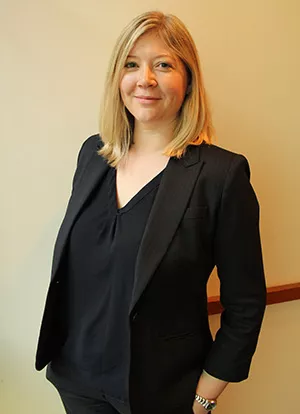Conservation Biologist Liz Nichols Spends Sabbatical at the State Department

Assistant Professor of Biology Liz Nichols
For Assistant Professor of Biology Liz Nichols, a sabbatical has taken her from the Science Center to the State Department.
For the next year and a half, Nichols is serving as the policy advisor from the State Department to the Global Environment Facility (GEF). The GEF is the international, multilateral financial body that supports work on the world’s six multilateral environmental agreements, including the Paris Agreement, which the U.S. remains bound to until November 5, 2020.
Nichols is based in the State Department’s Bureau of Oceans, International Environmental and Scientific Affairs, within the Office of Environmental Quality and Transboundary Issues, which develops and coordinates U.S. international policy on environmental issues ranging from biodiversity to air quality, pesticides and chemicals, and waste including mercury and other pollutants.
So how did an ecologist who studies biodiversity end up in the heart of the U.S. government working on international environmental policy?
For Nichols, the role came thanks to a fellowship she received from the American Association for the Advancement of Science (AAAS).
“AAAS performs a unique matching service, where the federal government identifies scientific needs, and AAAS identifies policy-interested scientific candidates, and sometimes even supports the salary of those candidates in places and times where the government cannot,” she says.
While it is may not seem so on the surface, Nichols notes that her background in science is ideal for this type of government position.
“We need scientists to be co-architects of science policy, and to also bring back to our academic lives an understanding of where, how, and by what process science can leverage impact,” she says. “My own research is very applied, as conservation biology is really a nexus science that links measuring how biodiversity responds to anthropogenic change drivers like habitat loss or climate change, and the active mitigation of those drivers through changes in policy and culture. In order to be an actual conservation biologist, you need to be comfortable and conversant working beyond biodiversity, with people and with policy. I looked at this opportunity during my first sabbatical as a kind of experiential masters in international environmental governance, and so far it has been exactly that.”
About a month into the job, Nichols’ responsibilities range from reviewing projects – including the environmental impacts of World Bank infrastructure projects – to structuring policy and programming associated with the U.S. pledge of financial support for multinational environmental agreements. It also includes lots of travel – having already been to Brasilia, Brazil, she’ll soon head to Stockholm, Sweden, and Da Nang, Vietnam, for GEF Council and Assembly meetings.
It goes without saying that her day-to-day is significantly different than what it was on campus. But Nichols is quick to point out that there is crossover from Swarthmore to D.C.
“This job is extremely fast paced, but it’s also extremely collaborative. Teaching at the College is absolutely a collaborative engagement with students, as is service within my department and across campus. All of my Swarthmore experience to date has had a direct positive impact on this current position at State.”



